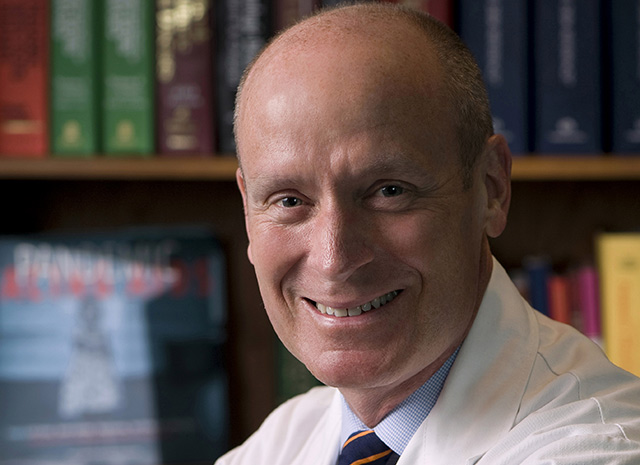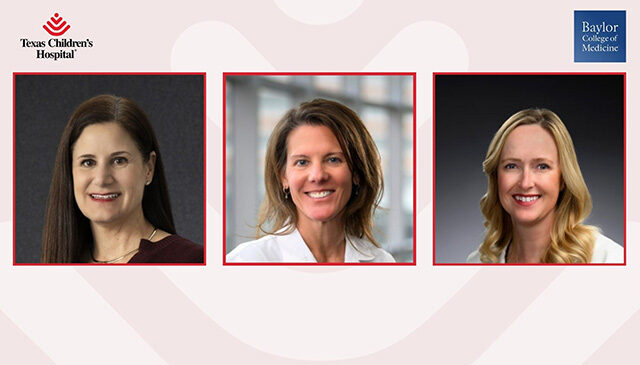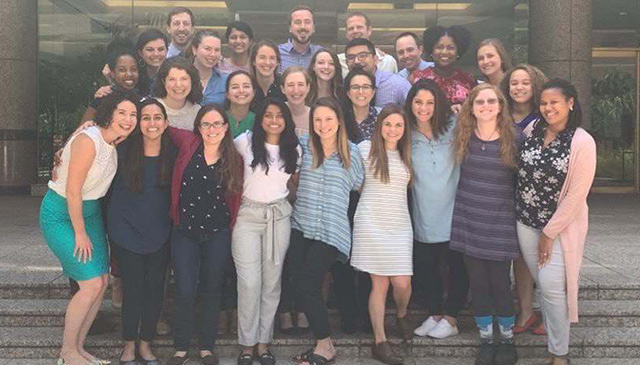July 1, 2019

When Dr. Mark W. Kline accepted the position of Texas Children’s Physician-in-Chief in 2009, it was an extraordinary moment for the hospital. The bar set by his predecessors, Dr. Russell Blattner and Dr. Ralph D. Feigin, was high to say the least.
In the decade since, Kline has worked tirelessly to fulfill Texas Children’s mission of providing the very best care to the children and families who need us most. One need only look at Texas Children’s Hospital today to see the transformational difference his leadership has made.
“Dr. Kline has been a spectacular leader during his entire tenure at Texas Children’s, but his years as Physician-in-Chief have been nothing short of extraordinary,” said President and CEO Mark Wallace. “I know the entire Texas Children’s family joins me in congratulating him on this milestone, in thanking him for his vision, leadership and steadfast commitment to Texas Children’s, and in wishing him much success in the years to come.”
In honor of 10 incredible years as Physician-in-Chief, we sat down with Kline for 10 questions about what it has meant to serve in the role, the lessons learned and his hopes for the future.
After being named Physician-in-Chief, you said you had big shoes to fill. What has assuming that mantle meant to you?
Kline: I never take lightly the position I have here. It’s an honor and privilege every day to come to work because I follow in the footsteps of people like Dr. Blattner and Dr. Feigin. Also because Texas Children’s Hospital has such a pristine reputation for excellence that has been built over the past 65 years. Frankly, that’s why every day I sweat every detail – because I know I’m responsible for the legacy of Texas Children’s and would never want to do anything to dishonor the work of the many people who’ve gone before me to lay the foundation for what we have here today.
How do you manage your numerous responsibilities without being overwhelmed?
Kline: No one could do it alone, that’s for sure. I depend on the good people around me.
I concentrated the first year I was in the job on building a leadership team. I was able to do that successfully, and I’ve had good continuity among those team members. You have to surround yourself with people who are capable, who you trust and who you know will represent you well. They know what I’d be thinking at any particular juncture, and I know how they work, what they think and what their strengths are. We make it work.
With more than 1,400 faculty members, another 200-plus Texas Children’s Pediatrics providers, and with facilities in Austin, West Houston and The Woodlands, it’s imperative to have to have that kind of support.
When you first took the position, what was your personal vision for Texas Children’s, and how have the past 10 years compared to that expectation?
Kline: These 10 years have exceeded anything I ever imagined. The rate of growth that we’ve experienced has been truly remarkable. When I started, one of the perceptions I had was that the hospital was a little siloed in the Texas Medical Center. I imagined a Texas Children’s Hospital that was more far-flung across the community. Today, we certainly have a better representation across the greater Houston area. But even I didn’t anticipate the expansion into Austin. And of course through Texas Children’s Health Plan, we’re up into East Texas and all the way to the Red River in the north.
All of that really gets at the root of our mission. We were never Houston Children’s Hospital. We are Texas Children’s Hospital. And I think we’re right on the cusp of fully realizing the initial vision the founders had for the hospital when they named it.
What have been the most remarkable differences or changes you’ve seen at Texas Children’s?
Kline: If you look at patient visits, inpatient admissions, the size of our medical staff, research funding, number of applications to our educational programs – everything is two-and-a-half times bigger than it was a decade ago. But we’re not just bigger, we’re better than we have ever been. The fact that we have been able to substantially reduce serious safety events in the hospital despite the incredible growth – that’s truly remarkable.
We also have added some really differentiating programs – the kind of things where if you talked to someone at another institution about it, they’d say, “Wow, you’re doing that at Texas Children’s Hospital! Who else is doing that?” And the answer is no one. These are programs such as our Global Health services; Dr. Peter Hotez’s work on vaccines for some of the most prevalent infectious diseases in the world; and our Heart Center. There are a number of things that we do today that weren’t in existence 10 years ago that distinguish us from any other children’s hospital, and I’m really proud of those.
What are some accomplishments of which you’re particularly proud?
Kline: You could start by going down the U.S. News & World Report rankings. We’re now the No. 3 children’s hospital in the country. The Heart Center is the No.1 center in the country for children, perhaps in the world. We have the No. 1-ranked Pulmonary Medicine service in the United States. We have four other subspecialties ranked among the top 3 in the nation in their respective categories. We’re better and deeper than we’ve ever been before.
The diversification of our research programs is also something to be proud of. Ten years ago, we had a total research portfolio of about $60 million across five areas. Today, we have more than $117 million in annual research funding across 16 discreet areas. There’s hardly an area of pediatric medicine where Texas Children’s is not making a meaningful contribution. That’s tremendously exciting.
And there’s not another children’s hospital in the world that can match Texas Children’s for contributions to global child health. We provide care and treatment for more HIV-infected children that any other organization or institution in the world. That’s something to really be proud of.
What’s one of the most important lessons you’ve learned?
Kline: I try to remind myself every day that there’s a lot of value in humility. As big as we are and as good as we are, it would be easy to feel a little bit smug. We can’t. We’ve got to pay attention and be better at every little thing we do. We owe it to the patients and the families that we serve.
Was there ever a special piece of advice anyone offered you that’s been particularly helpful in your role at Texas Children’s?
Kline: Sweat the small stuff.
What advice would you offer young caregivers – physicians, surgeons, nurses and others – who are early in their medical career?
Kline: Be open-minded about where the career will take you. It’s fine to have a plan, but be open to the possibility that the plan might change. I never planned to do what I’m doing now, but I’m happy I was open-minded to it because I really love it. It’s been a great ride.
How about those with an eye on assuming a leadership role in medicine?
Kline: This kind of role is not for everybody. You have to really be invested in it. But one of the attributes I have is that I’m not afraid to ask for help. And that’s a key for being a good leader – being able to call on others when you don’t know something, because nobody has all the answers. Doing that enables you to flesh out your own skill set and work collaboratively with others and their skills.
What do you hope the next 10 years look like at Texas Children’s?
Kline: Hopefully, we will continue to grow and extend our reach. I think we’ll be in more places than we are today, training more young professionals, building more capacity for the care of seriously ill children and doing what Texas Children’s Hospital does best.
I think we’re on a great trajectory. If we can continue that, and at the same pace, it’ll be a great 10 years ahead.
About Dr. Mark Kline
Dr. Mark Kline’s medical career began at the age of 15, when he started working at an emergency center in his hometown of San Antonio. At 16, he was a licensed EMT and on a trajectory for a career as a trauma surgeon, or so he thought.
Kline graduated summa cum laude from Trinity University (San Antonio) with a bachelor’s degree in biology. He came to Houston as a medical student at Baylor College of Medicine, where during clinical rotations he discovered a passion for Pediatrics. He graduated with honors from Baylor in 1981 and completed pediatric residency training, chief residency and a postdoctoral fellowship in pediatric infectious diseases at Baylor and Texas Children’s Hospital in 1987.
In 1996, Kline witnessed firsthand the devastation of pediatric HIV/AIDS during a trip to hospitals, clinics and orphanages in Romania. This experience gave birth to the Baylor International Pediatric AIDS Initiative (BIPAI) at Texas Children’s Hospital. The program builds health care infrastructure, trains health professionals and provides medical care and treatment to children and families across sub-Saharan Africa and in Romania. BIPAI currently provides HIV/AIDS care and treatment to more than 350,000 of the world’s poorest and least fortunate children and families, more than any other organization worldwide.
Those efforts have also given rise to Texas Children’s Global Health programs. Leveraging resources, infrastructure and medical programs initially created through BIPAI, Global Health now partners with more than 18 governments, UNICEF, USAID, CDC, WHO and many others, to share expertise and best practices around the world in underserved nations such as Argentina, Colombia, Haiti, Malawi, Mexico, Pakistan, Tanzania and Uganda.
An internationally respected leader in pediatric HIV/AIDS and global child health, Dr. Kline has been the recipient and principal investigator for more than $150 million in research grants from the U.S. National Institutes of Health and Centers for Disease Control and Prevention. He has authored more than 250 scientific articles and textbook chapters and has presented over 350 national and international lectures. Dr. Kline is editor-in-chief of Rudolph’s Pediatrics, one of the world’s most widely recognized and read medical textbooks.





